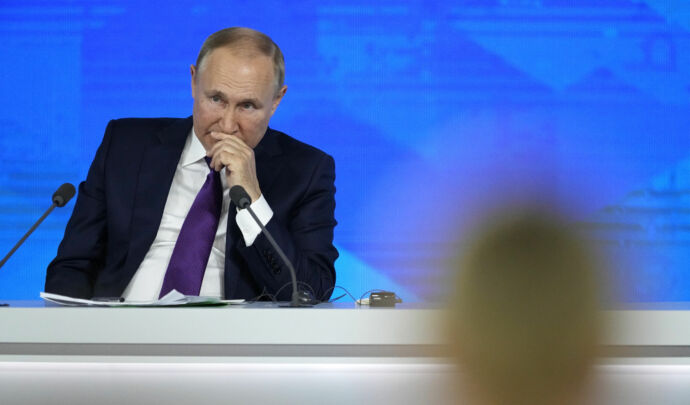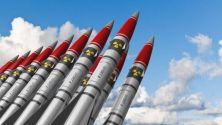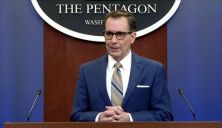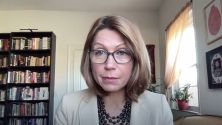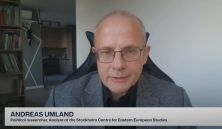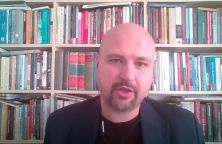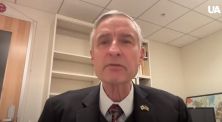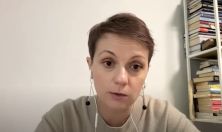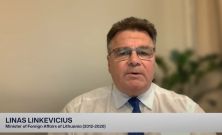Thursday, January 20, 2022
Hoover Institution, Stanford University
By Jonathan Movroydis
Paul Gregory is a Hoover Institution research fellow and Cullen Professor Emeritus in the department of economics at the University of Houston.
In this interview, Gregory analyzes whether Russia intends to launch a full-scale invasion of Ukraine. He concludes that such a move would be inconsistent with the cost-benefit model Russia President Vladimir Putin uses to weigh his country’s involvement in conflicts in Georgia (2008), the Crimean Peninsula and East Ukraine (2014), and Syria (beginning in 2015).
According to Gregory, Putin will only engage in small, low-cost wars that are likely to yield a limited number of Russian casualties. Putin will launch no war until the ground has been laid to blame the other side. Gregory doesn’t believe that a war with Ukraine fits these criteria. However, he does argue that the Russian troop buildup along its borders with Ukraine has allowed Putin to bolster his leverage over the United States and its allies. Putin now has the US worrying about an impending war, Gregory explains, and has forced the president of the United States to a perhaps unwise negotiating table.
Gregory says that Putin’s ultimate motives for his troop buildup are to prevent NATO expansion and force Ukraine, Georgia, and other countries surrounding Russia’s borders into neutrality. This is dangerous, Gregory points out, because these countries would lose any hope of being under NATO’s security umbrella or acquiring weapons from the West to deter future Russian aggression. Moreover, Russia will continue to engage in hybrid warfare against these countries to bring them directly into the Russian orbit.
Gregory believes that the most effective weapon that the United States has in its arsenal is harsh sanctions aimed at shutting down the newly constructed Nord Stream 2 natural gas pipeline that runs from Russian gas fields to its exit point in Germany. Such punitive measures would disrupt a key source of revenue for Moscow, but they have been met with resistance by European leaders, especially Germany, whose citizens rely on affordable Russian energy resources.
Gregory concludes that it is still possible to salvage a sanctions policy against Russia because German regulators have yet to certify Nord Stream 2 into service.
Is a Russian-Ukrainian war imminent?
Paul Gregory: There could be a war if there are some miscalculations. It all seems to rest on what Russian president Vladimir Putin has in mind. I’ve been thinking about Russia’s potential moves in terms of cost-benefit analysis. If you look at the pattern of Putin’s past decisions about war-making, he prefers to engage in small, low-cost wars that yield very few Russian casualties. Russia’s invasion of Georgia in 2008, its annexation of the Crimea in 2014, and its intervention in support of the Assad regime in Syria beginning in 2015 all conform to this model. These conflicts cost very few Russian lives, mostly those of paid mercenaries. Any Russian casualties that were suffered were kept secret by the Kremlin. One of the biggest state secrets in Russia is how many young men have been killed under Putin’s watch. He pays very close attention to these numbers because it is one of his key political vulnerabilities.
Also, another factor behind these smaller conflicts is that they are financed by members of Putin’s inner circle. They don’t come directly out of state budgets. We don’t know exactly what goes on within the Kremlin. However, we do know that the apex of Russian politics behaves very much like an organized crime family. Putin is very likely to turn to each oligarch and say, “Now it’s time for you to pay for this military operation.” The oligarchs don’t spend money from their coffers out of fidelity to Mother Russia but because they are on the hook for paying back favors they received from the Kremlin. The oligarchs who funded the annexation of Crimea, for example, received a multibillion-dollar contract to build a bridge connecting that peninsula over the Kerch Strait to Russia. Let’s say that bridge cost $2 billion to build and the oligarch receives a $5 billion payment from the state. That oligarch then reinvests part of that $3 billion profit back into the state in support of the Kremlin’s policy agenda, so that he can stay in good standing.
Another feature of armed conflict under Putin is that, as he builds up forces and prepares for conflict, he makes nationalistic appeals in order to gin up popular support. Kremlin-backed news media, for example, falsely claimed in 2014 that Ukrainians were coming from Kiev to the eastern part of that country to kill Russian-speaking people and engage in other atrocities.
Ultimately, I don’t believe that Putin will start a war with Ukraine because the current reality doesn’t conform with the model I just laid out. Putin cannot keep mass casualties a secret and understands from history that losing a war is a good way to lose your job or your head. The Russians remember all too well the fallout of their failed invasion of Afghanistan starting in 1979. The level of economic and political damage that resulted from that military adventure helped create conditions for the collapse of the Soviet Union a decade later. On the other hand, I am more worried that the current Russian troop presence on the Ukrainian border could result in an accidental clash of forces. Such an event could potentially lead to a large-scale conflict.
What are the Kremlin’s motives behind the massive deployment of military force demonstrated at the Ukrainian border?
Paul Gregory: Putin is going for broke right now because he has publicly revealed all his long-term goals—including scaling back NATO presence in Eastern Europe and returning Ukraine back under the umbrella of Russian influence. The buildup of troops signals a threat to Ukrainian sovereignty and makes the West worry about an impending war. The United States and European allies have thus been impelled to ask, “What can we do to prevent a war from breaking out?”
President Biden’s talks with Putin—which have thus far failed—all have centered on satisfying the Kremlin’s foreign policy goals. I don’t think Putin would have received this type of attention from the West if he had not built up Russia’s forces around Ukraine.
It is disturbing, but I imagine that Putin is smart enough to sense weakness. And wherever he senses weakness, he takes advantage. He sensed weakness in the way US forces left Afghanistan and allowed that country to be overrun by the Taliban. He also sees disunity in Europe regarding how to counter Russia. Germany’s new leadership has taken a softer stance on the Kremlin in large part because its population increasingly relies on affordable Russian oil and gas. The Nord Stream 2 gas pipeline, which begins in Russia’s northern fields and runs under the Baltic Sea to Germany, was completed in September 2021. From the pipeline’s exit point in Germany, Russia’s state-owned energy giant Gazprom intends to expand its share of the energy market throughout Europe.
The buildup of troops in Ukraine could also be explained by Putin’s desire to position Russia as a major global power. If Putin does invade, it would probably be a limited engagement to build a land bridge between Crimea and eastern Ukraine. Currently, you cannot enter Crimea by land except by Ukrainian territory. A Russian invasion of this sort would be a geopolitical disaster for Ukraine because it would likely lose some of its most strategic ports.
As you detail in The Hill, Russia has also intervened in energy-rich Kazakhstan. If Putin increases his influence over both Kazakhstan and Ukraine, would this translate into Russia expanding its share of world energy markets?
Paul Gregory: Although Ukraine is not a major energy producer, it is strategically important because it has been the central transit point for the delivery of half of Russian natural gas exports into Europe.
This is another reason why I don’t think it would be in the Kremlin’s interest to invade Ukraine, at least until Nord Stream 2 is certified for service. If a war ensues and Ukraine’s pipelines are shut down without Nord Stream 2 being made operational, Russia won’t be able to maintain a high level of energy exports and will lose large amounts of state revenue.
By comparison, Kazakhstan is a major producer of fossil fuels and allows multinational companies to run its energy sector. If the Kremlin were able to gain control over Kazakhstan’s resources through a policy of nationalization, Russia would increase its share of the world’s energy market by one-third. At this point we do not know what Russia will do. There are reports that Moscow has agreed to withdraw its so-called peacekeeping forces from Kazakhstan, which were originally deployed to quell protests against the Kazakh government over dramatic increases in fuel prices.
Russia has been referred to as a “paper tiger” by some politicians and foreign policy pundits. Do we often underestimate Russia’s strength on the global stage?
Paul Gregory: I think we do often underestimate Russia. Right now, Putin’s aggressive posture against Ukraine has put him in a favorable position to extract concessions from the United States and Europe. We all must remember that Russia is a major nuclear power. Russia’s military doctrine states that if the national government in Moscow is under threat, it is entitled to use tactical nuclear force.
That to me is quite chilling. I can’t buy the argument that Russia is a paper tiger in a military sense, because it could annihilate us at any time. It can be argued that since Russia’s economy is in poor shape, it won’t be able to sustain the state’s military power over the long term. But as the economist John Maynard Keynes once said, “In the long run, we are all dead.”
What specific concessions would Russia like to see from the United States and Europe?
Paul Gregory: Russia would like to see assurances that NATO will not admit to its membership Ukraine, Georgia, or any other country that borders Russian territory. They would like to see the “Finlandization” of these and other countries, that is, to declare themselves “neutral” with respect to Russia and NATO, just as Finland did when it signed a peace treaty with the Soviet Union in 1948.
I would predict severe consequences if Finlandization of these states were to happen. Putin would employ hybrid warfare on these neutral countries and rapidly turn them into Russian satellites. If they are declared neutral, they would lose Western protection and the ability to acquire weapons to defend themselves.
How can the United States and its allies best counter Russia under the current circumstances?
Paul Gregory: I think it would be healthy to recognize that, at this point, negotiations won’t help us reach a favorable policy outcome vis-à-vis Russia. We only have one weapon that could catch Putin’s attention and that is very harsh sanctions aimed at shutting down the Nord Stream 2 pipeline—the key to Putin’s energy stranglehold over Europe. The problem is that Biden waived sanctions against Nord Stream 2’s operator in negotiations with German Chancellor Angela Merkel in July 2021. As well, last week the US Senate voted down a bill introduced by Senator Ted Cruz (R-TX) that would have sanctioned businesses associated with the pipeline.
Although Nord Stream 2 has been completed, it has yet to be certified by German regulators. This at least offers some hope that the situation can still be salvaged.
Source: Hoover Institution

